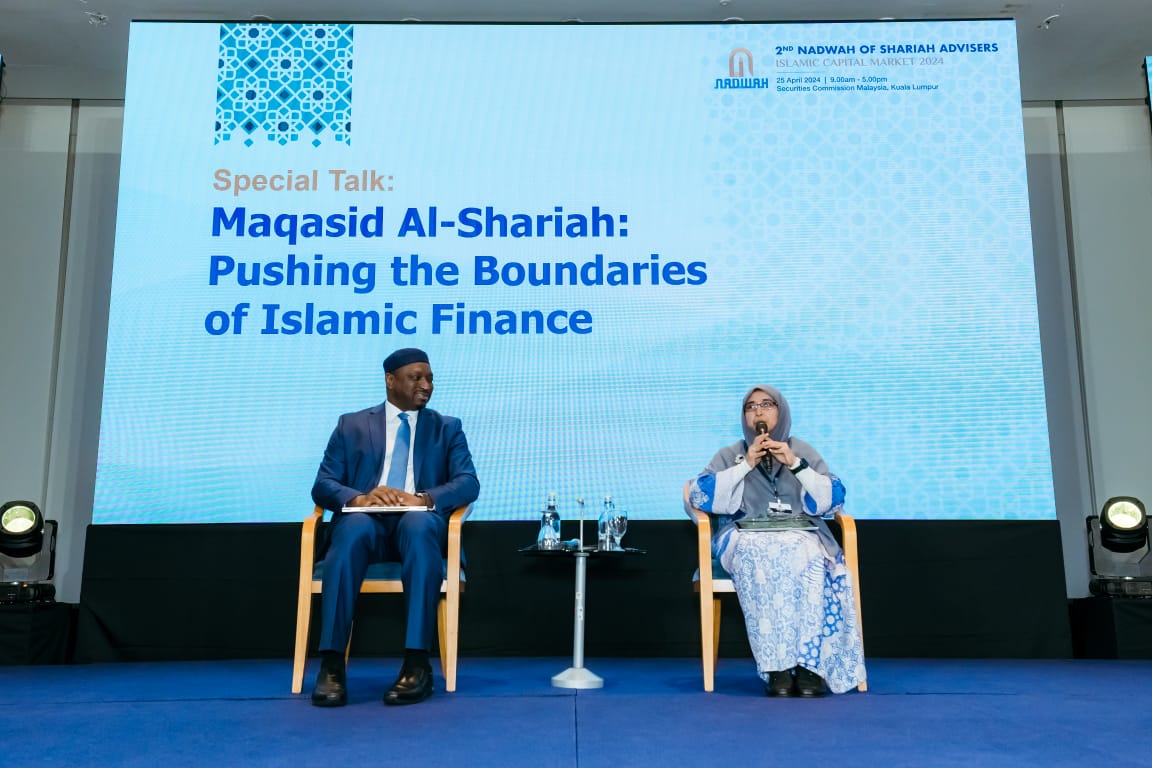
At the invitation of Malaysia’s Securities Commission, H.E. Prof. Koutoub Moustapha Sano, Secretary General of the Academy, delivered a scientific lecture on the Maqasid Shariah in Islamic Economics at the 2nd seminar for Shariah Advisors of Malaysia’s Islamic Banks and Financial Institutions on Thursday 10 Shawal 1445, corresponding to 25 April 2024, at the headquarters of the Securities Commission in the Central Bank of Malaysia.
His Excellency began his lecture by expressing his thanks to the Securities Commission for inviting him to participate in this important symposium, which is considered a scientific forum for Shariah advisors in emerging Islamic financial institutions, praising its selection of the lecture’s topic, which is urgently needed to enhance awareness and maximize attention to it, by highlighting its importance, status, how to activate it, and use it to advance the Islamic economy in general and securities in particular, hoping to put an end to the general repetitive talk about Maqasid Sharia (higher intents or purposes of Sharia).
His Excellency highlighted that the Islamic economy is included in Islamic jurisprudence, namely under the category of financial transactions, has its purposes that are unique to it, which are derived from the general overall purpose characterized by the purpose of preserving money, which is one of the necessary interests and overall purposes of Islamic law. His Excellency explained that the ability of the Islamic economy to address the devastating effects of the contemporary global economic crises resulting from conflicts, wars, and unrest depends mainly on a deep awareness of Maqasid of money in order to take it as a general framework for effective solutions capable of addressing these effects. Therefore, jurists, scholars, and economic policymakers alike must explore appropriate solutions to the crises in light of these clear Maqasid to determine and emphasize that the Islamic economy not only meets individual material needs but also meets the community’s material needs as a whole. His Excellency then spoke about the most critical Maqasid in Islamic economics, which Imam Muhammad al-Tahir Ibn Ashur, rahimahu Allah, is considered the modern founder and renewer of the field of Maqasid in his book entitled Maqasid al-Sharia al-Islamiya, where he explained that the Maqasid al-Sharia in financial transactions are five, which are the promotion of money, clarity, conservation, justice and stability, and pointed out that these purposes represent the ends for which contracts, sales and transactions were legislated and the wisdom and secrets behind prohibiting many contracts and transactions that are pearls of wisdom achieving these purposes.
His Excellency pointed out that preserving the purpose of prosperity is the purpose of prohibiting hoarding, monopoly, favoritism, and corruption, as they are all transactions that harm the growth of wealth and its circulation in society; preserving the purpose of justice is also the purpose of prohibiting riba, bribery, forgery, exploitation, cheating, and deception; preserving the purpose of clarity is the purpose of prohibiting the sale of gharar (uncertainty)and transactions based on ignorance; the purpose of preserving the purpose of stability is the purpose of contracts that achieve sustainability and comprehensive welfare of the individual and society; and the purpose of protecting the principle of preservation is to reach all the above mentioned above.
His Excellency explained that these purposes are derived from the principles on which Islam’s view of wealth and property is based, namely that wealth belongs to Allah and man is entrusted with it and entrusted with it, which means that man must abide by his disposition of wealth in earning, spending and financing by what Allah has legislated for us. He may not violate His commands and prohibitions because Allah is the true owner of wealth, and this doctrine is based on considering money as one of the necessities of life that must be preserved. It is also based on considering the passion for money as an instinct and instinct on which man is born, and this does not conflict with Sharia unless this attachment goes beyond the legitimate limit, such as leading to monopolizing, hoarding, and collecting it in prohibited ways. Finally, this view is based on considering money as a means and not an end in itself, which makes the way it is collected, consumed, spent, and financed subject to the extent to which it achieves the above-mentioned Sharia objectives.
Based on the above, His Excellency called Sharia supervisors to take the Sharia purposes of financial transactions as the governing framework leading the discourse on transaction matters and issues. His Excellency called on them to refer to these objectives and take them as a criterion and a reference point for weighting and to choose between different jurisprudential opinions regarding contracts and transactions, especially when facing financial challenges with new contracts and transactions, considering that they are the ends and outcomes that contracts and transactions are legislated to achieve. His Excellency concluded by renewing his appeal and calling researchers, scholars, and those interested in Islamic finance to pay more attention to the objectives of Sharia in the various subjects and issues.
His Excellency expressed his hopes that the contemporary Islamic economic arena would witness more serious and in-depth scientific studies that reveal the Maqasid of Islamic economics in general and its topics and themes in particular. He also hoped that Sharia auditors would activate these sound and clear maqasid when making ijtihad on new contracts and transactions in general and when weighing and choosing between opinions. His Excellency hoped that Shari’ah auditors would activate these sound and clear objectives when making jurisprudence on new contracts and transactions in general and when weighing and choosing between ancient and modern jurisprudential opinions and jurisprudence woven around contracts and transactions in particular, hoping that contracts, transactions and sales will become contracts, transactions and sales that help society combat poverty, reduce the disparity between individuals, and achieve the individual and the society’s social justice and comprehensive well-being.
At the end of the lecture, His Excellency answered several questions raised by some of the participants, such as highlighting that Imam Ibn Ashour’s consideration of the preservation of wealth as one of the Maqasid related to financial transactions is problematic, and he does not recognize it, considering that the preservation of wealth is one of the five overall purposes of Sharia, not a special or partial purpose. Therefore, the first is to consider achieving comprehensive welfare as a fifth purpose in addition to the previous four purposes of Sharia.
Dr. Marjan bint Mohammed, Acting Executive Director of ISRA, moderated the panel discussion.
Read Also
Lastest










